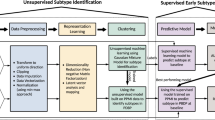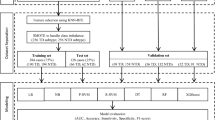Abstract
Parkinson's disease (PD) is a progressive, neurodegenerative disease characterised by the presence of motor and non-motor symptoms and signs. The symptoms of PD tend to begin very gradually and then become progressively more severe. The rate of PD progression is hard to predict and is different from one person to another. Namely, while in some patients the disease develops fast in just a few years from the diagnosis, in some the disease takes a more idle course and progresses slowly. We aimed to identify patients that develop severe motor symptoms within four years from PD diagnosis (early progressors) and separate them from those in whom severe symptoms develop beyond this point. We used data from the Parkinson’s Progression Markers Initiative (PPMI) dataset to calculate motor progression of the disease by the use of motor scores as assessed by MDS-UPDRS III. The predictors were defined as baseline scores of selected clinical variables and the difference between motor scores at 1-year after enrolment in the study and the same scores at baseline. The rationale for predictor selection was that they should be readily available in routine clinical practice. We tested four different classifiers: logistic regression, decision tree, random forest, and gradient boosting. The best performing classifier was the logistic regression with an area under the ROC curve of 81%. We believe this can be the basis for a reliable and explainable classifier, using only standard clinical variables, for identifying early progressors with high recall (80%) three years in advance.
Access this chapter
Tax calculation will be finalised at checkout
Purchases are for personal use only
Similar content being viewed by others
Notes
- 1.
Since we had a validation set in the inner cross validation loop, we decided to use it to tune this parameter. We tried to increase the number of features n until the mean performances of the chosen algorithms on the inner loop continued to increase. When, rising n, they started to decrease we found the optimal number of features n = 6.
References
Post, B., Merkus, M.P., de Haan, R.J., Speelman, J.D., CARPA Study Group: Prognostic factors for the progression of Parkinson's disease: a systematic review. Mov. Disord. Off. J. Mov. Disord. Soc. 22(13), 1839–1988 (2007)
Reinoso, G., Allen, J.C., Jr., Au, W.L., Seah, S.H., Tay, K.Y., Tan, L.C.: Clinical evolution of Parkinson’s disease and prognostic factors affecting motor progression: 9-year follow-up study. Eur. J. Neurol. 22(3), 457–463 (2015)
Venuto, C.S., Potter, N.B., Dorsey, E.R., Kieburtz, K.: A review of disease progression models of Parkinson’s disease and applications in clinical trials. Mov. Disod. Off. J. Mov. Disord. Soc. 31(7), 947–956 (2016)
Iddi, S., et al.: Estimating the evolution of disease in the Parkinson’s progression markers initiative. Neuro-Degenerative Dis. 18(4), 173–190 (2018)
Tsiouris, K.M., Konitsiotis, S., Koutsouris, D.D., Fotiadis, D.I.: Prognostic factors of rapid symptoms progression in patients with newly diagnosed Parkinson’s disease. Artif. Intell. Med. 103, 101807 (2020)
Chahine, L.M., et al.: Predicting progression in Parkinson’s disease using baseline and 1-year change measures. J. Parkinson’s Dis. 9(4), 665–679 (2019)
PPMI Site, https://www.ppmi-info.org, last accessed 2021/01/22
Chawla, N.V., Bowyer, K.W., Hall, L.O., Kegelmeyer, W.P.: SMOTE: Synthetic minority over-sampling technique. J. Artif. Intell. Res. 16, 321–357 (2002)
Acknowledgements
Data used in the preparation of this article were obtained from the Parkinson’s Progression Markers Initiative (PPMI) database (www.ppmi-info.org/data). For up-to-date information on the study, visit www.ppmi-info.org. PPMI–a public-private partnership – is funded by the Michael J. Fox Foundation for Parkinson’s Research and funding partners (The list with full names of all of the PPMI funding partners found at www.ppmi-info.org/fundingpartners). The research was supported by the Slovenian Research Agency (ARRS) under the Artificial Intelligence and Intelligent Systems Programme (ARRS No. P2–0209).
Author information
Authors and Affiliations
Corresponding author
Editor information
Editors and Affiliations
Rights and permissions
Copyright information
© 2021 Springer Nature Switzerland AG
About this paper
Cite this paper
Cotogni, M., Sacchi, L., Georgiev, D., Sadikov, A. (2021). Detection of Parkinson's Disease Early Progressors Using Routine Clinical Predictors. In: Tucker, A., Henriques Abreu, P., Cardoso, J., Pereira Rodrigues, P., Riaño, D. (eds) Artificial Intelligence in Medicine. AIME 2021. Lecture Notes in Computer Science(), vol 12721. Springer, Cham. https://doi.org/10.1007/978-3-030-77211-6_18
Download citation
DOI: https://doi.org/10.1007/978-3-030-77211-6_18
Published:
Publisher Name: Springer, Cham
Print ISBN: 978-3-030-77210-9
Online ISBN: 978-3-030-77211-6
eBook Packages: Computer ScienceComputer Science (R0)




